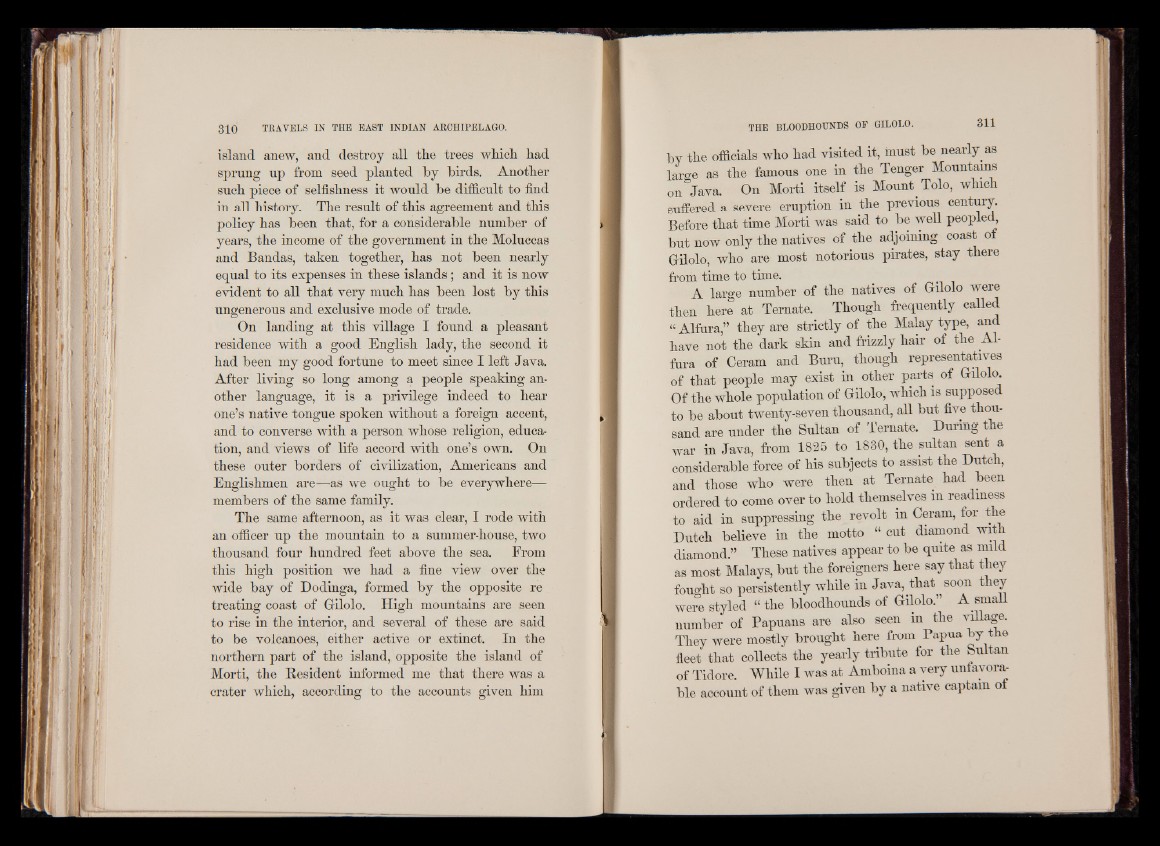
island anew, and destroy all the trees which had
sprung up from seed planted hy birds. Another
such piece of selfishness it would be difficult to find
in all history. The result of this agreement and this
policy has been that, for a considerable number of
years, the income of the government in the Moluccas
and Bandas, taken together, has not been nearly
equal to its expenses in these islands; and it is now
evident to all that very much has been lost by this
ungenerous and exclusive mode of trade.
On landing at this village I found a pleasant
residence with a good English lady, the second it
had been my good fortune to meet since I left Java.
After living so long among a people speaking another
language, it is a privilege indeed to hear
one’s native tongue spoken without a foreign accent,
and to converse with a person whose religion, education,
and views of life accord with one’s own. On
these outer borders of civilization, Americans and
Englishmen a renas we ought to be everywhere—
members of the same family.
The same afternoon, as it was clear, I rode with
an officer up the mountain to a summer-house, two
thousand four hundred feet above the sea. From
this high position we had a fine view over the
wide bay of Dodinga, formed by the opposite re
treating coast of Gilolo. High mountains are seen
to rise in the interior, and several of these are said
to be volcanoes, either active or extinct. In the
northern part of the island, opposite the island of
Morti, the Resident informed me that there was a
crater which, according to the accounts given him
by the officials who had visited it, must be nearly as
large as the famous one in the Tenger Mountains
on Java. On Morti itself is Mount Tolo, which
suffered a severe eruption in the previous century.
Before that time Morti was said to be well peopled,
but now only the natives of the adjoining coast of
Gilolo, who are most notorious pirates, stay there
from time to time.
A large number of the natives of Gilolo were
then here at Ternate. Though frequently called
“ Alfura,” they are strictly of the Malay type, and
have not the dark skin and frizzly hair of the Alfura
of Ceram and Buru, though representatives
of that people may exist in other parts of Gilolo.
Of the whole population of Gilolo, which is supposed
to be about twenty-seven thousand, all but five thousand
are under the Sultan of Ternate. During the
war in Java, from 1825 to 1830, the sultan sent a
considerable force of his subjects to assist the Dutch,
and those who were then at Ternate had been
ordered to come over to hold themselves in readiness
to aid in suppressing the revolt in Ceram, for the
Dutch believe in the motto “ cut diamond with
diamond.” These natives appear to be quite as mild
as most Malays, but the foreigners here say that they
fought so persistently while in Java, that soon they
were styled “ the bloodhounds of Gilolo.” A small
number of Papuans are also seen in the village.
They were mostly brought here from Papua by the
fleet that collects the yearly tribute for the Sultan
of Tidore. While I was at Amboina a very unfavorable
account of them was given by a native captain of